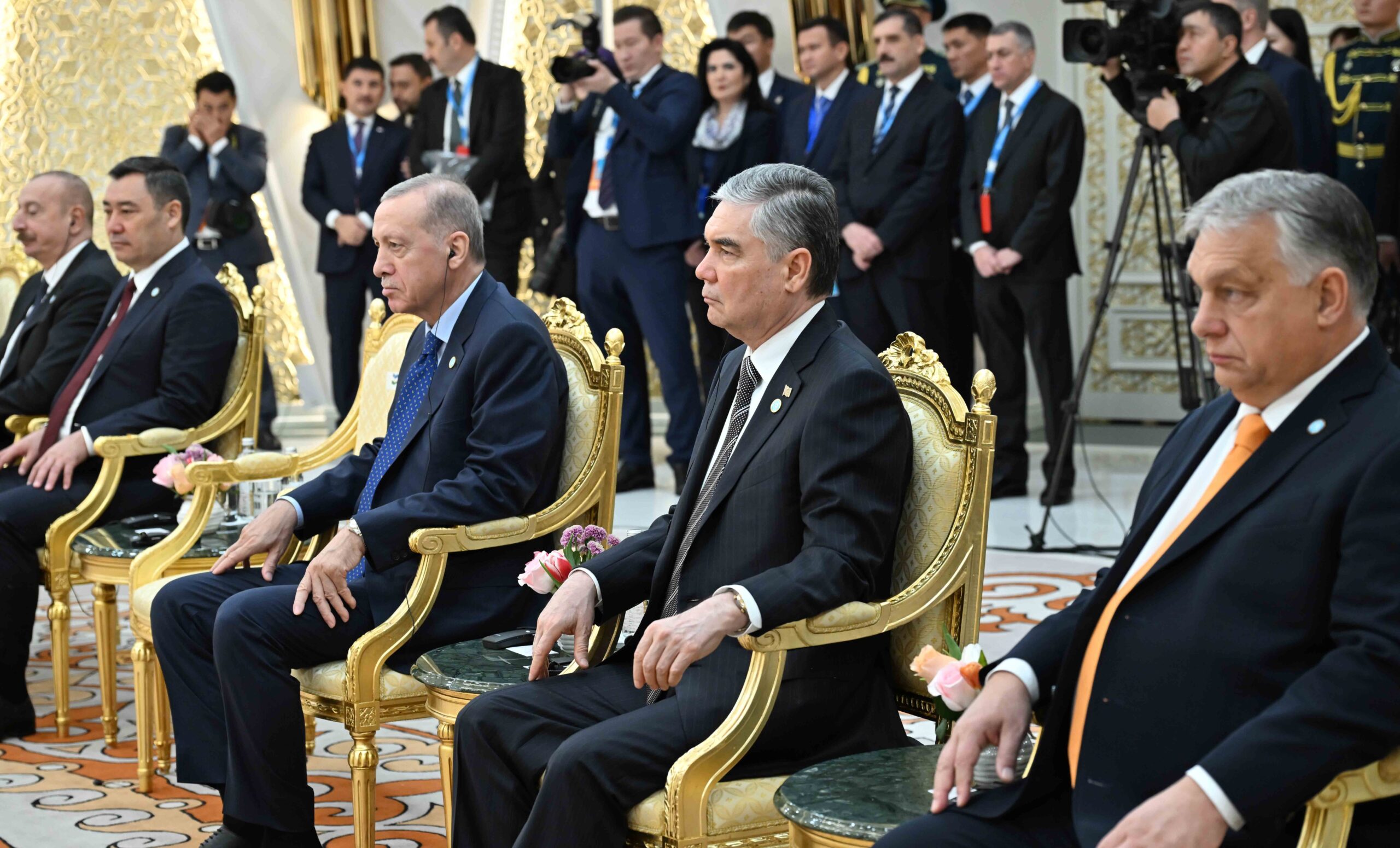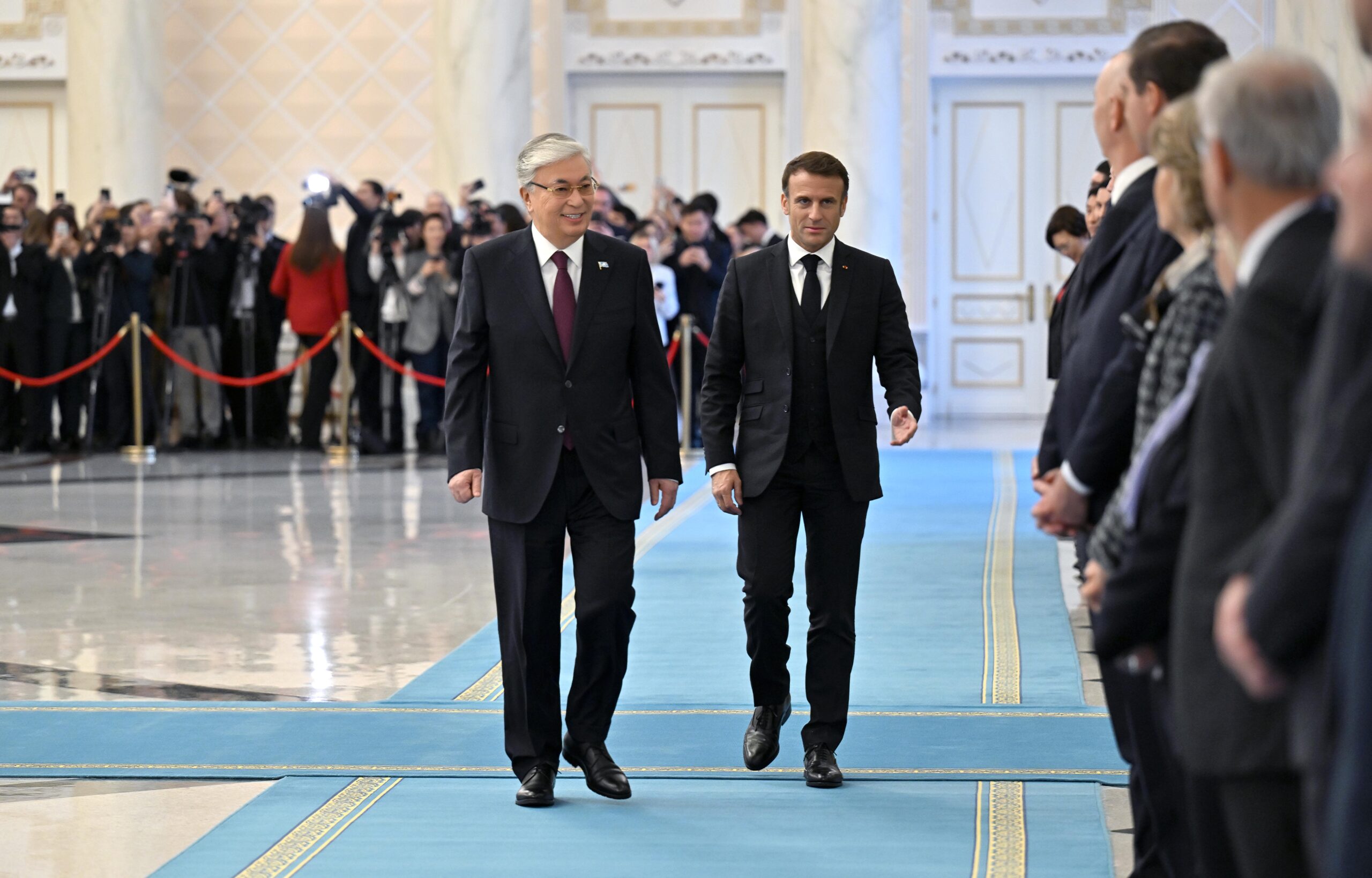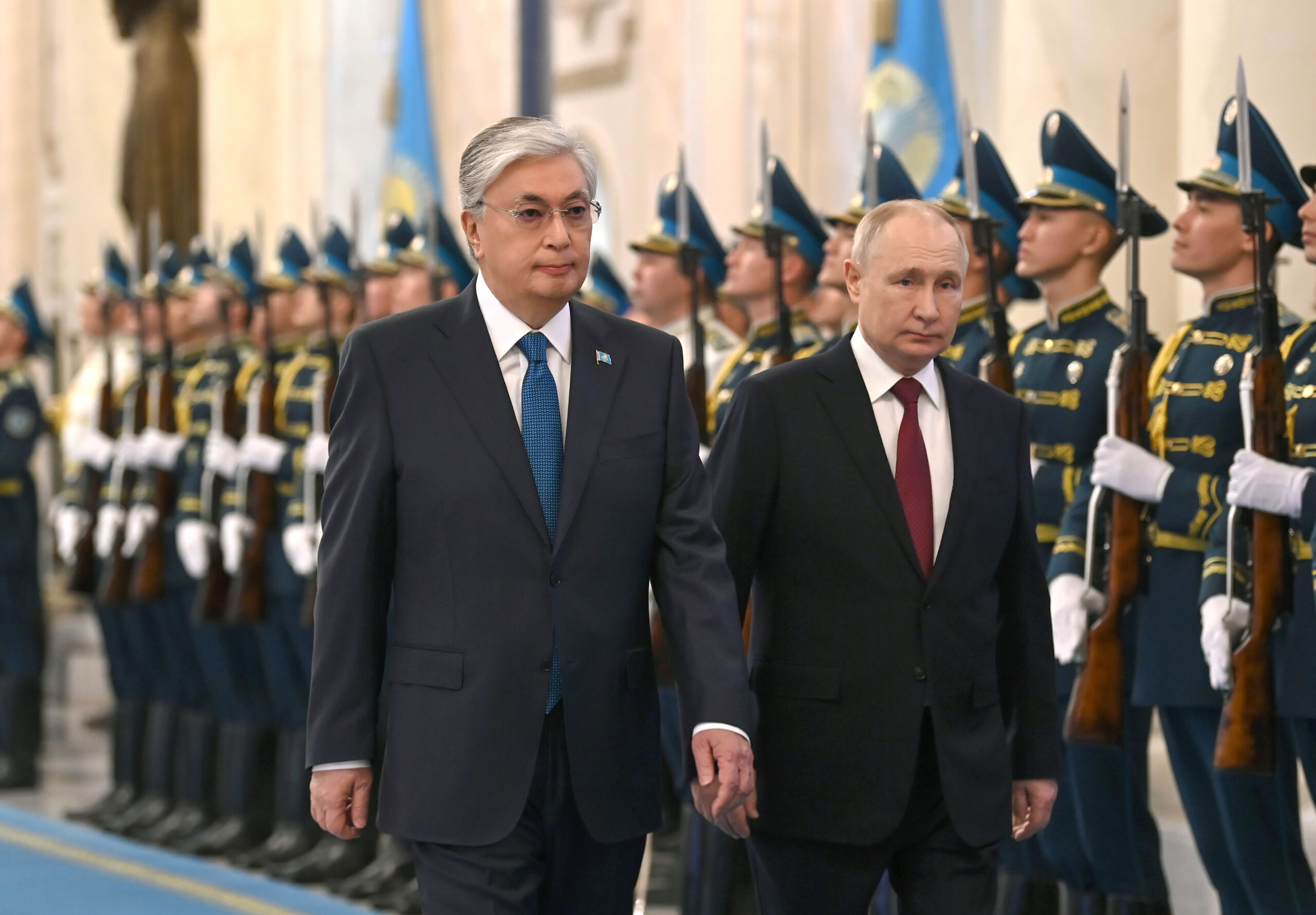ASTANA – Geopolitical shifts in 2023 urged Kazakhstan to align its multivector foreign policy with Eurasia’s evolving landscape while preserving its commitment to bilateral and multilateral obligations and ambitions towards new achievements on the world stage.

Kazakh President Kassym-Jomart Tokayev and Chinese President Xi Jinping commended the development of bilateral partnership during the Oct. 17 meeting in Beijing. Photo credit: Akorda.
Apart from enhancing cooperation within the Central Asian region, Kazakhstan’s efforts to develop collaboration with Eurasian partners are yielding positive results. This year is no exception.
Kazakhstan-China visa-free travel
China, the world’s second-largest economy, shares a border of 1,783 km with Kazakhstan. Bringing bilateral relations with China to a new qualitative level is a priority for its Central Asian neighbor. President of Kazakhstan Kassym-Jomart Tokayev has repeatedly underscored the effectiveness of interstate cooperation, including during his latest meeting with President of China Xi Jinping in October in Beijing.
Last month opened a new chapter in Kazakhstan-China cooperation. From Nov. 10, Kazakh and Chinese citizens are exempt from visa requirements for private affairs, tourism, medical treatment, international transport, transit and business purposes. The visa-free stay is capped at 30 calendar days from the moment of crossing the state border, with a cumulative total of 90 calendar days within 180 days.
Earlier, Chinese citizens were eligible to stay in Kazakhstan without a visa for 14 days from June 2022, while Kazakh citizens had to get a visa to enter China.
The tourist flow from China to Kazakhstan, according to the Kazakh Tourism national company, rebounded by 45% in the first half of 2023. The company, which oversees tourism development in the country, expects it will fully reach pre-pandemic levels by year-end.
To step up tourism exchange, next year was declared the year of Kazakhstan’s tourism in China. It is expected that it will strengthen business ties, facilitate trade, and increase investments.
Kazakh officials continue to promote freedom of travel with other countries, which retained visa requirements in response to a unilateral visa-free regime established by Kazakhstan, including for the European Union (EU) countries, Japan, India, and the United States.
In 2022, Kazakhstan accounted for 45% of China’s $70.2 billion trade with the five Central Asian countries. According to the Ministry of National Economy, trade turnover between Kazakhstan and China between January and August this year hit $19 billion, 22.6% higher compared to the same period in 2022. China accounts for 21% of Kazakhstan’s foreign trade turnover.
Apart from that, Kazakhstan is ready to become a vital international transport and logistics hub, with 85% of all land transit traffic from China to Europe.
In the past 15 years, Kazakhstan has allocated more than $35 billion to deliver large infrastructure projects such as the Kazakh-Chinese logistics center in Lianyungang, the Khorgos dry port, the Western Europe – Western China transit highway, and the railway corridor from China to Iran.
Turkic integration flourishes with Kazakhstan’s critical involvement
Drawing the international community’s attention, the Turkic unification gains momentum amid geopolitical shifts. The heads of Turkic states continue to review the collective responsibility of the Turkic world in meeting global challenges.

Leaders of the OTS member and observer states in the Kazakh capital. Photo credit: Akorda.
Kazakhstan’s decisive role in the Turkic unification continues to strengthen. On Nov. 3, Astana welcomed the heads of Turkic states – Azerbaijan, the Kyrgyz Republic, Türkiye, Turkmenistan, and Uzbekistan at the 10th-anniversary summit of the Organization of Turkic States (OTS).
The summit took place ahead of Kazakhstan’s chairmanship in the OTS for 2024. As part of the summit, President Tokayev introduced eight pillars that underline next year’s chairmanship – traditions, unification, reforms, knowledge, trust, investment, mediation, and energy.
As a result, the heads of state signed 12 agreements to bolster Turkic unity. These agreements encompass a roadmap for the 2023-2027 transport communication program, regulations concerning permanent representatives, the introduction of new flags for Turkic organizations, and the decision to grant the Economic Cooperation Organization (ECO) an observer status within OTS.
The territory of the OTS countries, brimming with vast economic opportunities, is home to 260 million people. This year, trade turnover between the Turkic states surpassed $22 billion. Member nations collaborate across nearly 30 domains, with an amplified emphasis on trade, transport, customs cooperation, security, education, and digitalization.
The foundational significance of ethnic and cultural roots, language, and shared history is a driving force for the increasing focus on economic and political integration among Turkic countries.
Kazakhstan has always taken new initiatives to deepen Turkic cooperation. In 2006, first President of Kazakhstan Nursultan Nazarbayev proposed the establishment of the Turkic Council, the former name of the OTS.
Prior to that, Kazakhstan played a key role in founding the Interparliamentary Assembly of Turkic Countries (TurkPA). In the early 1990s, Kazakhstan was among the initiators behind the establishment of the International Organization of Turkic Culture, known as TURKSOY.
The idea to set up the Turkic Investment Fund (TIF), aimed at mobilizing the economic potential of member states and attracting investments, also belongs to Kazakhstan. OTS member states assigned the Kazakh capital, Astana, the status of a financial center of the Turkic world. During this year’s OTS summit, President Tokayev emphasized the need to develop a market for green financing.
EU and Kazakhstan expand dialogue in critical minerals development, energy, and transport
The EU is Kazakhstan’s key trade and investment partner. Kazakhstan’s overall trade with the EU in 2022 was substantial, reaching a remarkable $41.9 billion, according to the Kazakh Foreign Ministry.

French President Emmanuel Macron paid an official visit to Kazakhstan on Nov. 1. Photo credit: Akorda.
In January-September this year, trade turnover between the EU and Kazakhstan hit $30.5 billion. As for the foreign direct investment (FDI) inflows from the EU, in the first quarter of this year, they reached $5.2 billion.
In partnership with the EU, Kazakhstan has proved its reliability by contributing to energy security through oil supplies and to the nuclear energy sector through uranium supplies.
Both sides continue to expand dialogue, seeking touchpoints in critical mineral development and forging sustainable solutions in energy and transport. Out of the 34 critical materials listed by the EU, Kazakhstan produces 18. Kazakh and European experts continue to explore cost-effective and sustainable supplies of critical raw materials and decarbonization of energy production.
International experts claim that the EU countries need to pay more attention to emerging opportunities in transport and logistics in cooperation with Kazakhstan. The EU’s participation in the development of the Trans-Caspian International Transport Route (TITR) can result in boosting its trade ties with China and Central Asia.
Green hydrogen production is also part of the Kazakhstan-EU agenda. The Hyrasia One project in Kazakhstan’s Mangystau Region is carried out by the German-Swedish Svevind Energy Group. It involves building and operating a desalination plant with a 255,000 cubic meter capacity per day, a 40-gigawatt renewable energy station (wind, solar), and a 20-gigawatt water electrolysis production, mainly for export or domestic consumption.
The EU and Kazakhstan are both committed to carbon neutrality in the long run. Step by step, Kazakhstan is implementing green solutions. This year, the country introduced the carbon neutrality strategy by 2060.
In 2021, it adopted the new Environmental Code, and in 2022, it registered the first green political party. Kazakhstan’s climate change agenda aligns with the European Green Deal, a set of policy initiatives of the European Commission aimed at making the European Union climate-neutral by 2050.
At the same time, the fast-paced development of economic cooperation and partnership in energy and transport does not exclude contradictory patterns, indicating the need for deepening mutual trust between the sides.
The recent visit of French President Emmanuel Macron to Astana was perceived by the expert community as a testament to Kazakhstan’s growing role in ensuring energy security for the EU. Kazakhstan and France signed 13 agreements in transport and logistics, engineering, health care, and agroindustry worth more than $1.4 billion within the Kazakhstan-France Business Forum. With the second largest proven oil reserves in Eurasia, Kazakhstan also remains one of the main suppliers of crude oil to the French market.
Kazakhstan expands cooperation with Russia in logistics and food security
Russia is the undisputed leader in the number of enterprises with foreign capital in Kazakhstan, with nearly 20,000 companies operating in the country. Bilateral trade turnover between the countries hit a record high of $27 billion, with direct investments from Russia exceeding $20 billion.

Kazakhstan’s President Kassym-Jomart Tokayev and Russia’s President Vladimir Putin during Putin’s official visit to Kazakhstan on Nov.9. Photo credit: Akorda.
Russia’s President Vladimir Putin paid an official visit to Astana on Nov. 9 to participate in a plenary session of the 19th Interregional Cooperation Forum, which highlighted the growing importance of the North-South transport corridor, and the need to develop storage infrastructure, including grain elevators and fruit storage facilities.
Both Kazakhstan and Russia are the leading producers of agricultural goods and enter the top ten world leaders in grain exports, accounting for almost 10% of arable land and 9% of pastures and hayfields globally. Coordinated efforts are needed to ensure food security, develop modern agricultural science, and introduce innovations in the agro-industrial sector.
The Kazakh-Russian partnership prioritizes the development of new logistics directions through Central Asia and the capacity enhancement of existing routes to China. Both presidents highlighted the possibility of increasing the volume of Russian gas supplies to Kazakhstan and Uzbekistan, which is currently agreed at three billion cubic meters a year for each country.
Kazakhstan has utilized the surplus of Russian natural gas, which Europe has primarily stopped buying. Along with Uzbekistan, Kazakhstan has begun procuring Russian gas for domestic needs while preparing to ramp up its gas exports to China.

